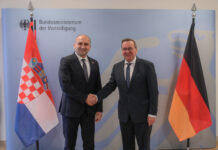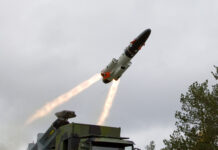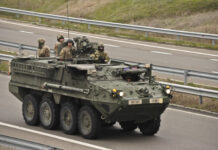As Europe marks 30 years since the war in Bosnia and Herzegovina ended, Ukraine’s ongoing conflict has brought about urgent discussions on peace, security, and integration on the continent. Ties between Ukraine and the Western Balkans have deepened rapidly, shaped by shared histories, common vulnerabilities, and a mutual goal of EU membership. High-level summits have led to closer cooperation in defence, economic integration, and democratic reforms. This emerging partnership is now seen as central to Europe’s long-term stability – and a litmus test of the EU’s credibility and commitment to its enlargement project.
Partners in European reinvention
The European continent continues to bear witness to a brutal conflict showing little sign of abating. The War in Ukraine has already destroyed Europe’s security order, and its impact is felt elsewhere in Europe, nowhere less so than in the Western Balkans as the region continues to deal with the impact of its own wars (including the 1999 Kosovo war). Lessons learned from the Balkans will undoubtedly be applied to any settlement and post-conflict arrangement in Ukraine with refugee return, demining, elections, rights of non-majority communities, good governance and human rights, all needing to be addressed.
Among one of the more compelling developments since the start of the Ukraine war is the emergence of a security and defence partnership between Kyiv and the six Western Balkan states (‘WB6’). It is compelling, because both Ukraine and the WB6 were once considered parallel (and even competing) European projects, but with the War in Ukraine, both regions have edged closer together. Today, they are linked by common aspirations for EU membership, shared exposure to external pressures – ergo Russia and its proxies in the Balkans – and increasing strategic interdependence. As Ukraine fights for its survival and defends its sovereignty, and while Western Balkan countries steer their own winding (and often frustrating) course to full European integration, both regions have found political alignment and practical collaboration not only useful – but even essential.
With the EU focused on supporting Ukraine, Brussels has begun to pay less attention to the Western Balkans, leading to closer ties between Ukraine and southeastern European countries through four high-level summits since 2023. These meetings, held in Athens, Tirana, Dubrovnik, and most recently Odesa in June 2025, have built a framework for cooperation on security, economic integration, democratic reforms, and EU accession goals.
![Participants at the fourth Ukraine-Southeast Europe summit gathered in Odesa on 11 June 2025. [Office of the President of Ukraine]](https://euro-sd.com/wp-content/uploads/2025/07/Odesa-summit-2025_Office-of-the-President-of-Ukraine-Kopie-1024x683.jpg)
The Tirana EPC gathering also highlighted aspirations and expectations of the Western Balkan states for closer integration with the European bloc. While Balkan support for Ukraine is very real, leaders of the region are acutely aware that they risk being given lower priority when it comes to Brussel’s foreign policy priorities. The future of Ukraine within Europe has seen to that. For its part, Albania as host, used the opportunity to highlight its own overall democratic reform efforts and absolute commitment to EU accession. The Tirana summit therefore offered Western Balkan nations yet another chance to engage directly with EU leaders, pressing their own membership bids, and stressing the importance of EU accession based on merit, but also to showcase regional cooperation on the continent’s southern periphery.
Shared history helps
Ukraine and Western Balkan countries share a joint legacy of former communist rule and more recently, of a post-communist transformation. Today’s states emerged following the dissolution of the Soviet Union and Socialist Federal Republic of Yugoslavia respectively (minus Albania with its 46 years of Marxist rule under Enver Hoxha). Both Ukraine and the former-Yugoslav republics were immediately confronted with democratic vulnerability, economic fragmentation, and institutional weakness exposing them to external and internal manipulation. These vulnerabilities were further compounded by territorial disputes and ethnic divisions.
The re-emergence of Russia under Putin as a revisionist power has affected both regions very differently. Ukraine suffered direct military aggression, beginning with the 2014 annexation of Crimea, followed by the full-scale invasion in February 2022. More recently, the Western Balkans has been faced with increased Russian spoiling, most notably in BiH with its fragmented construction, but also in Montenegro and Serbia, through the use of energy blackmail and political meddling.
For both regions, above all, the EU represents a tangible opportunity for long-term economic and political stability, but also an opportunity to strategically anchor themselves in terms of security and defence. Again, Serbia is the exception here, attempting a delicate balancing act between courting Brussels and a stated goal of EU membership, while at the same time avoiding upsetting Moscow, its historical partner. EU integration is now viewed as the only feasible framework through which sovereignty, economic growth, and stability can be achieved.
Ukraine-Southeast Europe summits
Athens 2023 Summit: A turning point
One of the first significant political demonstrations of Ukraine–Western Balkans solidarity was on show at the Athens Summit in August 2023. The summit was organised exactly 20 years after the historic Thessaloniki summit which confirmed the EU enlargement perspective for the Western Balkans. Twelve heads of state and government, including from host-country Greece, Ukraine (with President Zelenskyy attending), Bulgaria, Croatia, Moldova, Romania, and the ‘Western Balkan 6’ (WB6) – Albania, Bosnia and Herzegovina, Kosovo, Montenegro, North Macedonia, and Serbia took part.
![Leaders gathered at the Ukraine–Western Balkans summit in Athens, on 21 August 2023. [Office of the President of Ukraine]](https://euro-sd.com/wp-content/uploads/2025/07/Athens-Summit-2023_Office-of-the-President-of-Ukraine-Kopie-1024x683.jpg)
Tirana – February 2024
Just six months after Athens, the Tirana Summit was held, hosted in February 2024. In the 12-point summit declaration, the participants again condemned Russia’s aggression and reiterated their firm support for Ukraine’s sovereignty and territorial integrity within its internationally recognised borders. They also endorsed President Zelenskyy’s ‘Peace Formula’ as a framework for achieving a “just and lasting peace” and committed to supporting efforts to hold Russia accountable for crimes of war. The declaration also committed summit participants to increasing the amount of international assistance for Ukraine, including financial, military, and humanitarian.
Dubrovnik – October 2024
Later the same year, the Summit was held in Croatia, resulting in the Dubrovnik Declaration, which reaffirmed support for Ukraine’s sovereignty, condemned Russia’s aggression, and endorsed Ukraine’s aspirations for EU and NATO membership. The declaration highlighted the importance of energy security and for the return of Zaporizhzhia Nuclear Power Plant to Ukrainian control.
Odesa – June 2025
The 4th Ukraine–Southeast Europe Summit was held in Odesa again gathering leaders from 12 regional countries amid ongoing Russian attacks. President Zelenskyy warned of Russian efforts to destabilise southern Ukraine, Moldova, and Romania, calling for stronger regional security cooperation. Interestingly, Serbia’s President Aleksandar Vučić paid his first visit to Ukraine, offering Belgrade’s support for reconstruction, though he declined to sign the joint Summit declaration, highlighting Serbia’s delicate diplomatic stance between Russia and the West.
Facing shared cyber threats
Cybersecurity remains a shared sense of vulnerability for Ukraine and the Western Balkans as they continue to face Russia’s aggressive hybrid warfare campaign, in the form of cyberattacks and political meddling.
Following the first two high-level summits in Athens and Tirana, Ukrainian cybersecurity experts, hardened by years of dealing with hybrid attacks, began working with Western Balkan partners to boost cyber defence mechanisms and increase technical capabilities. Capacity-building efforts have been focused on the protection of high-value and particularly vulnerable areas, including critical infrastructure, electoral systems, and public administration networks.
Cooperation in the military field is also increasing. NATO members Albania, Montenegro, and North Macedonia have trained Ukrainian troops and different bilateral agreements have set up joint exercises addressing, inter alia, combat medicine and counter-UAV strategies. Beyond NATO, non-aligned states (Bosnia and Herzegovina, and Kosovo for example) have expressed solidarity through training exchanges and demining support.
![Demining is a field where many Western Balkans countries have significant expertise and capability to contribute to Ukraine’s own efforts. [Ukrainian Ministry of the Economy]](https://euro-sd.com/wp-content/uploads/2025/07/Ukrainian-demining-effort_Ukrainian-Ministry-of-the-Economy-Kopie-1024x682.jpg)
Economic integration
Beyond security, the Ukraine–Western Balkans relationship is increasingly based on economic cooperation and infrastructure connectivity. Although Ukraine has restored some of its Black Sea shipping routes, the overland alternative for Ukrainian grain and other exports are transported via the ports and rail routes in the Western Balkans, supported by the EU-Ukraine Solidarity Lanes (EUR 2 billion in EU funds), a framework launched in May 2022 to create alternative transport corridors for Ukrainian imports and exports. These routes have since become essential to sustaining Ukraine’s economy, responsible for transporting 76 million tonnes of Ukrainian grain.
By April 2025, the ‘EU Solidarity Lanes’ have transported:
- About 70% of Ukraine’s imports (compared to 30% via the Black Sea)
- Roughly 70% of Ukraine’s exports of non-agricultural goods (compared to 30% through the Black Sea)
- About 20% of Ukraine’s grain and related grain exports (compared to nearly 80% through the Black Sea)
Energy cooperation has rapidly become increasingly important as both regions attempt to reduce their traditional dependence on Russian fossil fuels, with integration of electricity grids now accelerating. Western Balkan countries are also exploring renewable energy investment opportunities with Ukraine – particularly in wind and solar power – to align with EU green transition goals.
United under the European project
EU accession remains the driving force for Ukraine and countries of the Western Balkans. Despite different timelines, pace of reforms and benchmarks, the overall strategic agendas are similar: strengthening the rule of law, combatting corruption, judicial reform, all in the name of EU acquis alignment.
Importantly, both the Athens and Tirana summits stressed the need for the EU to meet its own promises to the WB6 and also to Ukraine. However, repeated accession delays, combined with general enlargement fatigue in some member states (and in the region itself), risk undermining reform incentives. Through solidarity and practical cooperation, Ukraine and the Western Balkans are underlining that enlargement rises above bureaucracy and represents a crucial geopolitical opportunity.
Conclusion and outlook
Despite the overall positive trajectory for the WB6 regarding EU accession, a number of obstacles remain, not least with prevailing political instability and democratic backsliding in certain WB6 states (notably BiH and Serbia), not to mention open bilateral disputes – especially around Kosovo’s status, but as also seen with North Macedonia and neighbouring Bulgaria. Serbia’s ongoing balancing act between trying to keep both Russia and the EU happy at the same time, will continue to muddy the waters in this region.
![President of Serbia Aleksandar Vučić (left) shaking hands with President Volodymyr Zelenskyy (right) on the sidelines of the Athens 2023 summit. Serbia has attempted to maintain a delicate diplomatic balance to keep both Russia and the EU on side. [Office of the President of Ukraine]](https://euro-sd.com/wp-content/uploads/2025/07/Vucic-meets-Zelenskyy-in-Athens-2023_Office-of-the-President-of-Ukraine-Kopie-1-1024x683.jpg)
The interlinkage between Ukraine and the Western Balkans is not coincidental – it is the result of common external threats and the EU’s magnetic attraction. There has been a notable shift from the rhetorical support seen previously, to more concrete and structured collaboration. Ranging from cyber defence, humanitarian demining, to economic connectivity, this partnership has become a key pillar of Europe’s strategy for addressing its most pressing security challenges. What remains is for the EU to match this momentum with clarity, consistency, and courage. The road to full integration is a deliberate and shared choice for Ukraine and the WB6, clearly shaping the common future they are determined to construct together.
Lincoln Gardner


![Participants at the fourth Ukraine-Southeast Europe summit gathered in Odesa on 11 June 2025. [Office of the President of Ukraine]](https://euro-sd.com/wp-content/uploads/2025/07/Odesa-summit-2025_Office-of-the-President-of-Ukraine-Kopie.jpg)



![2025 in the Western Balkans: A year-end SITREP Soldiers from the Czech company, part of the EUFOR Multinational Battalion, conducted a series of joint training exercises in Mostar alongside operators from Bosnia’s State Investigation and Protection Agency (SIPA). [EUFOR BiH]](https://euro-sd.com/wp-content/uploads/2025/11/Handshake_EUFOR-BiH-218x150.jpg)

![Connect-4 The European Super RAP developed by NATO’s ACCS is shared with NATO’s Allied Air Command headquarters in Ramstein, western Germany. Two CAOCS, controlling NATO airspace above northern and southern Europe, generate these RAPs. [NATO]](https://euro-sd.com/wp-content/uploads/2025/06/NATO-Allied-Air-Command-NATO-Kopie-218x150.jpg)
![Emerging military alliances in the Western Balkans: A redrawing of the regional security map : Signing of Declaration on Military Cooperation between Defence Ministers of Albania, Croatia and Kosovo, in Tirana, on 18 March 2025. [Croatian MoD]](https://euro-sd.com/wp-content/uploads/2025/06/Adriatic-Bloc-signing-ceremony_Croatian-MoD-Kopie-218x150.jpg)




